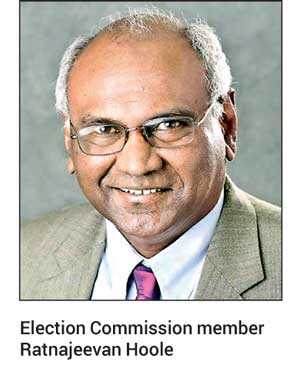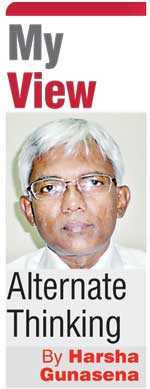Friday Feb 20, 2026
Friday Feb 20, 2026
Tuesday, 5 May 2020 00:26 - - {{hitsCtrl.values.hits}}
Ratnajeevan Hoole, a member of the Election Commission of Sri Lanka (EC), stirred many a discussion of the behaviour of a public servant in recent times due to the unprecedented nature of his published writings and interviews given to the newspapers. The President said that EC is not independent citing the behaviour of Hoole and many others are of the same view.
Hoole is from Nallur, Jaffna. His father was an Anglican priest and the mother was a lecturer of the Kopay Teacher Training College. His wife is a fellow academic, and they have three daughters and one son. His brothers Rajan and Paul are PhD holders. Rajan was a co-author of ‘Broken Palmyra,’ which equally criticised the atrocities of both LTTE and the State. His brother Noel is the Head of the Technical College, Vaddukoddai. His sister is in New Zealand and he lost two of his brothers.
He graduated from University of Moratuwa with a BSc in electrical engineering. He holds a PhD in electromagnetic field computation from Carnegie Mellon University, USA and a DSc in computational electromagnetics from the University of London (N.M. Perera also had a PhD and a DSc). He was working in Singapore, Canada and USA and came back to Sri Lanka in 1999.
He was appointed Vice Chancellor of University of Jaffna By President Mahinda Rajapaksa in 2006. However, he could not take up the position due to death threats of the LTTE. He went back to USA and came back in 2010 after the defeat of LTTE.
During the 2011 Local Government elections he documented and reported on violation of election law by Government-backed EPDP. After EPDP complained about the defamatory report, he was summoned to the Magistrate’s Court of Kayts and he left the country without going to Court. Later he returned to the country and was appointed a member of the EC in 2015.
Prior to his recent interview to Daily Mirror on 24 April, he has sent a letter to the EC which was published in the newspapers. He claimed that the Chairman of the EC telephoned him and suggested 28 May as the date of election, to which he has disagreed. He further mentioned in the letter that Indian journalist P.K. Balachandran has written in an article that the President wanted the election to be held on 28 May and an announcement of the EC was expected.
His problem was that the Chairman was taking decisions all by himself. He gave various examples to that effect and referred to the press conferences of the Chairman as follows: “He gives press conferences where there is no agreement as a commission on what is to be said and we two sit on either side like dummies.”
Hoole also revealed that the EC Chairman was involved in drafting the gazette dissolving the Parliament in October 2018. “Although Mahinda Deshapriya denies it, I am informed by senior staff that the gazette dissolving Parliament in October 2018 was prepared by Director Channa de Silva, the two went together to the Presidential Secretariat up to the gate where de Silva alighted from the car and returned, leaving Deshapriya to proceed alone.”
Landmark judgement
In October 2018, Hoole as an individual went to the Supreme Court challenging the decision of the President. There are no provisions in the Constitution specifically mentioned that the EC can go to the Supreme Court seeking for clarifications. Since the EC is not an individual it cannot file a Fundamental Rights petition in the Supreme Court.
However, in the case Karunathilaka and another (Varuna Karunathikala and Sunanda Deshapriya) Vs. Dayananda Dissanayake, Commissioner of Elections and another, on 27 January 1999, Justice Mark Fernando with the consent of the other judges including the Chief Justice sated as follows: “Should the 1st respondent have insisted on the poll being held on 28.8.98? While I appreciate the difficult situation in which he was, nevertheless it is necessary to remember that the Constitution assures him independence, so that he may fearlessly insist on due compliance with the law in regard to all aspects of elections – even, if necessary, by instituting appropriate legal proceedings in order to obtain judicial orders. But the material available to this Court indicates that he made no effort to ascertain the legal position, or to have recourse to legal remedies.”
This is a landmark judgement where Justice Fernando redefined the Article 35 of the Constitution where the presidential immunity was dealt with. Justice Fernando found fault with the Commissioner for not instituting appropriate legal proceedings in order to obtain judicial orders. Hence it is up to the EC to find out that way to obtain judicial order when necessary.
Hoole without waiting for the action of EC went alone to the Supreme Court in his capacity as an individual using the only way available to him which was to file a Fundamental Rights application against the President since EC in any case cannot implement an illegal order. If so, it is against the Nuremburg Principles although those were defined based on war crimes. More importantly Hoole won the case. Therefore, it cannot be argued that Hoole was not independent as a result of this act.
Justice Mark Fernando once said that he was delighted to deliver judgements in favour of the public interest and against the authoritarian rulers. Hence Hoole in this case was fearlessly independent.
Hoole defended the decision of the EC to hold the elections after 2 June. “SLMC’s Rauff Hakeem and Nizam Kariapper have declared our decision unconstitutional. Not quite. Yes, Article 70(5) is violated. It is violated not by us but because it is impossible for the new Parliament to meet by 2 June 2020 given COVID-19.”
Gotabaya Rajapaksa’s dual citizenship
In an interview to Daily Mirror on 28 November 2019, Hoole candidly expressed his views about the dual citizenship of the presidential candidate Gotabaya Rajapaksa (GR). He said that he inquired from the US Embassy about the dual citizenship of GR and was informed that they could answer only if the EC asked the question. When he informed this to the EC, he was told that GR was not yet a candidate.
“I thought citizenship is serious enough to raise on nominations day as an objection from me, but was advised by my two colleagues and lawyer friends that others would object, hence I should keep myself dissociated from such objections to examine those objections when they are filed. I was assured that typed-up objections were circulating. However, no objections were raised.”
His intention was to make sure that all candidates were abide by law. There were no objections from the rival candidates. But still he was not happy. He would have been happy only if a proper authority, in this case the US Embassy, informed the EC that GR was no more a US citizen.
Definition of independence
The question that now arises is: What is the definition of independence of a member of the EC? Is it only to be independent from the rival candidates and ensure a level playing field? In respect of judicial independence, “It is extremely important that their judicial authority be exercised in an impartial manner.”
The United Nations Development Programme in April 2012 in Cairo, Egypt adopted a set of principles for independent and sustainable electoral management. At the forum five key principles for electoral management were identified; those were, independence, impartiality, transparency, professionalism, and sustainability.
“Independence refers to an Electoral Management Board having a degree of institutional and organisational autonomy and not receiving or responding to undue pressure; impartiality as being an honest broker, playing a fair game and overseeing the political process; transparency means being (and being perceived as) an honest broker; professionalism implies providing a good and cost-effective service; and sustainability means ensuring the possibility of having efficiently managed elections as periodic events.”
Therefore, although the political parties did not raise any objections it is the duty of the EC to satisfy themselves whether GR has adhered to the Constitution in respect of his citizenship.
Media guidelines and compliance
We have observed that the EC Chairman complains that the guidelines issued by them were not followed by the private media institutions. Hoole was of the view that EC could ask the TRC to withdraw the frequency licence of errant broadcasters. This situation arisen since the 19th Amendment went backwards of the provisions in Article 104B.
Prior to the 19th Amendment the Commission could issue guidelines to any broadcasting or telecasting operator and they had to ensure compliance with those guidelines. After the 19th Amendment the EC can issue guidelines to all and State institutions should ensure compliance of those guidelines which should be approved by the Parliament.
The Constitution now is silent about the compliance of the private broadcasters and telecasters. This is making a mockery of the intentions of the 19th Amendment. Hoole’s comment came in this background.
Hoole was very critical of attacking the Muslims who were travelling from Puttalam to Mannar to vote on the Presidential Election day. He mentioned that his request to have special polling stations in Puttalam for them was turned down although the law allowed it.
He said that although the Chairman rightly speaks of the need for national empathy for minorities, there were cruel jokes at the Commission premises about Muslims being cheats who will vote again if allowed to return to Puttalam. We have observed a similar behaviour recently at Derana TV station at an accidentally-televised show at the interval of a program where Muslims were slashed by participant politicians including that of the JVP.
However, the information revealed by Hoole did not include confidential information of the EC. According the Right to Information Act, the information relates to an election conducted by the Commissioner of Elections which is required by the relevant election laws to be kept confidential, should not be revealed to the public. Also, according to the Act, a request for information shall not be refused where the public interest in disclosing the information outweighs the harm that would result from its disclosure.
Therefore, the actions of Hoole improves the transparency of EC and compels its Chairman and the members to be independent and impartial which would strengthen the confidence of the public in the EC. Hoole, by his very presence, I believe, strengthens the EC and the hands of its Chairman as well. He is a legend of our times and that is why his actions are controversial.